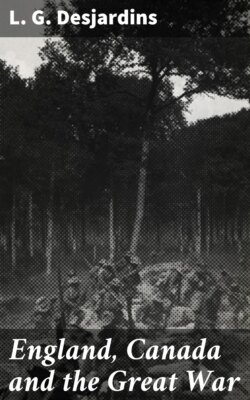Читать книгу England, Canada and the Great War - L. G. Desjardins - Страница 19
На сайте Литреса книга снята с продажи.
Canada Is Not A Sovereign State.
ОглавлениеTable of Contents
As long as Canada will remain under the flag of Great Britain—and for one I hope it will yet be for many long years,—it is evident that it will not be a "Sovereign State" in the full sense of the word.
One can hardly believe that the Nationalist leader, at page 17 of his pamphlet—"Hier, Aujourd'hui, Demain"—"Yesterday, To-day, To-morrow," opens a chapter with the title: "Les Colonies autonomes sont des Etats Souverains."—"The autonomous colonies are Sovereign States."
Mr. Bourassa was evidently led to the grievous error contained in the preceding title by a complete misapprehension of the true meaning of the word "autonomous." He took "autonomy" for "Sovereignty," being under the delusion that the two are synonymous.
Any student of History knows, or ought to know, that after the war which culminated in the independence of the United States, England adopted an entirely new colonial policy. She was the first Sovereign Power, and has ever since remained the only one, to realize that the old system was doomed to failure, that it was worn out. Her leading statesmen, who always ranked amongst the most eminent the world over, were more and more convinced that the only safe colonial policy was that which would grant "self-government" to the colonies, trained to its harmonious working, for their interior management. The true meaning of this new policy was that several of the colonies were, by acts of the Imperial Parliament, called to the exercise of a share of the Sovereignty, well defined in their respective constitutional charters. Canada was one of the first British colonies to enjoy the advantages of such a large part of the Sovereign rights.
Such "autonomous colonies" as Canada, Australia, New Zealand, South Africa, Newfoundland, have been, and are to the present day, do not transform them into "Sovereign States," enjoying full "Sovereign powers." They are not "Independent States" in the full sense of the word.
That Canada is not a Sovereign State is proved beyond doubt by the very fact that she could not amend or change her constitutional charter by her own power and without a new Imperial law. If the Nationalist leader's pretention was sound, any member of the House of Commons, or of the Senate, in Ottawa, could propose a bill to repeal the British North America Act, 1867, and to replace it by another constitutional charter. The very supposition is absurd. Can it be imagined that His Excellency the Governor-General could be advised by his responsible Ministers to sanction, in the name of His Majesty the Sovereign of Great Britain, a bill repealing an Act of the Imperial Parliament? Still it is exactly what Mr. Bourassa's theory amounts to.
Our constitutional charter does not only provide what is called our Federal,—or National—autonomy, but also the Provincial autonomy. The powers of both are well defined in the Imperial Act. The Provinces of the Dominion also exercise that share of the Sovereign rights delegated to them by the Imperial Parliament. Would the Nationalist leader draw the extravagant conclusion that the territory of any one of the Provinces cannot be declared in the "State of War" with a Foreign Power, by His Majesty the King, without the assent of the Ministers of that Province? Still that absurd proposition would not be more so than that affirming the necessity of the assent of the Canadian Cabinet, to a declaration of War involving Canada in an Imperial struggle.
The Sovereign right of declaring war to, and of making peace with, another independent State, is vested in the King of Great Britain, acting upon the advice of his responsible Ministers in the United Kingdom. To the Imperial Parliament belongs the constitutional authority to deal with the Imperial Foreign Affairs.
It is plain that when Great Britain is at War with another Sovereign State the whole territory of the British Empire is in the "State of War" with that Nation.
It is inconceivable that Mr. Bourassa has seriously pretended that Canada was not at war with the German Empire the very moment the British Empire was so in consequence of the violation by Germany of Belgian neutrality. One can hardly believe that he has propounded the fallacious constitutional doctrine that His Majesty "the King of England hath not the right to declare Canada in the State of War without the assent of the Canadian Cabinet."
Where and when has the Nationalist leader discovered that the Canadian Ministers have the right to advise His Majesty upon all the questions pertaining to the Imperial Foreign Affairs? Any one conversant with the constitutional status of Canada knows that the Canadian Ministers have the right to advise the representative of the Sovereign only upon matters as defined by the British North America Act, 1867, and its amendments.
I was indeed very much surprised at the attempt of Mr. Bourassa to use the authority of Sir Erskine May in support of his erroneous pretension that the autonomous colonies of Great Britain were Sovereign States.
To all the students of the Constitutional History of England, Sir Erskine May is a very well known and appreciated writer. I have read his works several times over for many years. I was certain that he had never written anything to justify the Nationalist leader in quoting him as he did.
Here follows the paragraph of May's Constitutional History quoted by Mr. Bourassa in support of his own views:—
